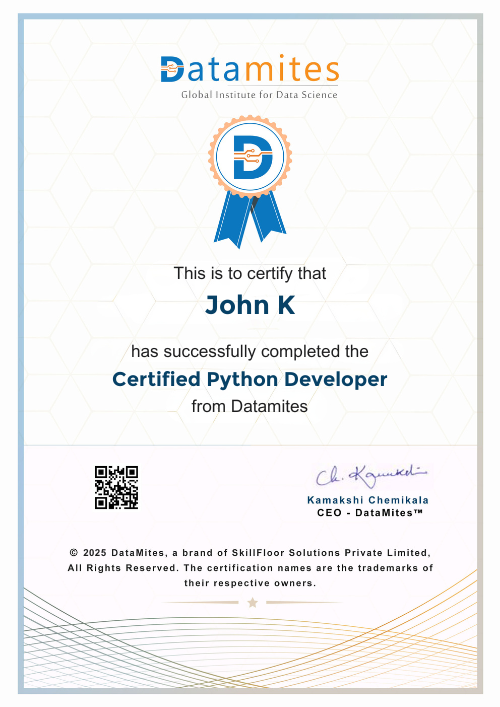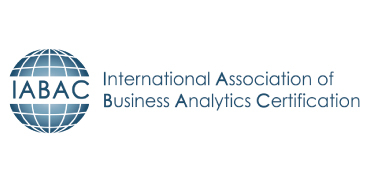Instructor Led Live Online
Self Learning + Live Mentoring
Customize Your Training

• Introduction of python
• Installation of Python and IDE
• Python Variables
• Python basic data types
• Number & Booleans, strings
• Arithmetic Operators
• Comparison Operators
• Assignment Operators
• IF Conditional statement
• IF-ELSE
• NESTED IF
• Python Loops basics
• WHILE Statement
• FOR statements
• BREAK and CONTINUE statements
• Basic data structure in python
• Basics of List
• List: Object, methods
• Tuple: Object, methods
• Sets: Object, methods
• Dictionary: Object, methods
• Functions basics
• Function Parameter passing
• Lambda functions
• Map, reduce, filter functions
• Decorators
• Generators
• Context Managers
• Metaclasses
• Inheritance and Polymorphism
• Encapsulation and Abstraction
• Class methods and static methods
• Special (magic/dunder) methods
• Property decorators - getters, setters, and deletes
• Working with files
• Reading and writing files
• Buffered read and write
• Other file methods
• Logging & Debugger
• Modules and import statements
• SQL Basics
• Creating DB Table
• INSERT, READ, UPDATE, DELETE
• Introduction to MongoDB
• CRUD operations in MongoDB
• namedtuple(), deque, ChainMap,
• Counter, OrderedDict, defaultdict,
• UserDict, UserList, UserString
• Exceptions handling with try-except
• Custom exception handling
• List of general use exception
• Best practice exception handling
• Generators, Iterators
• The Functions any and all
• With Statement
• Data Compression
• A Daytime Server
• Clients and Servers
• The Client and Server Programs
• Classes and Threads
• Multi-threading; thread life cycle
• Regular Expression Syntax
• Group, Split and wildcards
• Quantifiers
• Match, Search and Find all methods
• Character Sequence
• Introduction to OpenCV, Installation
• Basic Operations on Images
• Image Filtering
• Image Classification
• Introduction to GIT
• Basic Git commands
• Introduction to Flask and Installation
• Creating project
• Routing,templates, forms and database integration
• Deployment on render
• Django Introduction and Installation
• Creating a Project
• Django Architecture and File Structure
• Folder Structure, First Django project
• Database and Views, Static Files and Forms
• URL Mapping and Routing
• Defining Models and Relationships
• Database Migrations and Schema Changes
• Querying Data using Django ORM
• Model Forms and Form Validation
• HTML Forms in Django
• Model Forms and Form Validation
• Formsets and Inline Formsets
• File Uploads and Validation
• Deploying Django Applications
• Hosting Options (e.g., Heroku, AWS)
• Project Showcasing and Review
Python is a versatile language that can be used for a wide range of applications, including web development, scientific computing, data analysis, and artificial intelligence.
Guido van Rossum is credited with the introduction of the Python programming language in the late 1980s.
The differences between Python and Java programming can be seen in their syntax, programming paradigm, and application areas. Python's syntax is straightforward and readable, whereas Java emphasizes strict typing and structured programming.
The many benefits of Python programming language include its easy-to-read syntax, robust community support, vast collections of pre-existing code, and broad utility in multiple industries. Its versatility and simplicity make it an attractive choice for developers and companies, resulting in enhanced productivity and more efficient development cycles.
Python programming language is commonly used in job titles such as Data Scientist, Software Developer, Machine Learning Engineer, Data Analyst, Artificial Intelligence (AI) Researcher, Research Analyst, Financial Analyst, and DevOps Engineer for tasks such as data analysis, modeling, automation, and deployment.
Even if someone has no prior programming experience or a specific educational background, they can still learn Python as it is an easy-to-learn programming language.
Depending on the institution or training provider, the cost of Python courses can vary, typically falling in the range of a few hundred to a few thousand dollars.
Having strong problem-solving skills, logical thinking, and adaptability can help in learning Python effectively. Effective communication and collaboration skills are also beneficial when working on projects with others.
A python developer salary in Chicago is $138,068 as per Indeed.com.
There are no eligibility criteria for enrolling in Python courses in Chicago. Nevertheless, it is recommended to have some basic knowledge of programming concepts and mathematical skills to get the most out of the course.
Getting certified in Python can be very advantageous for career growth as it validates one's skills and knowledge. It can increase job prospects and earning potential and help to stand out among other job candidates.
Python has gained popularity in data science due to its ability to perform complex analysis and modeling. As a result, it has become a necessary skill for aspiring data scientists.
When it comes to Python training in Chicago, the Certified Python Developer Course stands out as an excellent choice for learners seeking a thorough and well-structured program that covers all essential concepts and skills.
Whether you are a beginner or an experienced programmer, you can enroll in the DataMites Certified Python Developer Training in Chicago. The course covers everything from the basics of Python to advanced programming concepts.
DataMites™ is an internationally accredited institution that specializes in data science. Our courses cater to a broad audience, and we have more than 25,000 students enrolled globally. Our three-step learning methodology includes self-study materials, live online training, and practical project work and placements to ensure a comprehensive understanding of the subject. Upon successful completion, you will receive a highly respected global certification from the International Association of Business Analytics Certification (IABAC).
Depending on your chosen specialization, the duration of DataMites Python courses in Chicago can range from 2 to 3 months. The Python Developer Course is a 3-month program, while other courses are 2 months long. Weekday and weekend classes are available to suit students' schedules.
The cost of DataMites' Python courses in Chicago varies depending on the mode of training chosen by the student, ranging from 253 USD to 380 USD, while the Certified Python Developer Training can cost anywhere from 253 USD to 418 USD.
While we do not offer offline Python training in Chicago, our online courses are designed to be highly flexible, allowing you to learn at your own pace and from anywhere with an internet connection.
With DataMites Flexi-Pass for Python Training in Chicago, candidates can attend sessions for up to three months and get their doubts resolved by experienced trainers, thereby improving their understanding of the language.
Once you have fulfilled all of the course requirements, you will receive a certificate of completion from DataMites.
Of course! We provide a demo class for our Python training course to help you make an informed decision.
We understand that every student has different payment preferences. Therefore, at DataMites, we accept various payment modes, such as Cash, Net Banking, Check, Debit Card, Credit Card, PayPal, Visa, Mastercard, and American Express, to cater to the different payment needs of our students.
The DataMites Placement Assistance Team(PAT) facilitates the aspirants in taking all the necessary steps in starting their career in Data Science. Some of the services provided by PAT are: -
The DataMites Placement Assistance Team(PAT) conducts sessions on career mentoring for the aspirants with a view of helping them realize the purpose they have to serve when they step into the corporate world. The students are guided by industry experts about the various possibilities in the Data Science career, this will help the aspirants to draw a clear picture of the career options available. Also, they will be made knowledgeable about the various obstacles they are likely to face as a fresher in the field, and how they can tackle.
No, PAT does not promise a job, but it helps the aspirants to build the required potential needed in landing a career. The aspirants can capitalize on the acquired skills, in the long run, to a successful career in Data Science.



